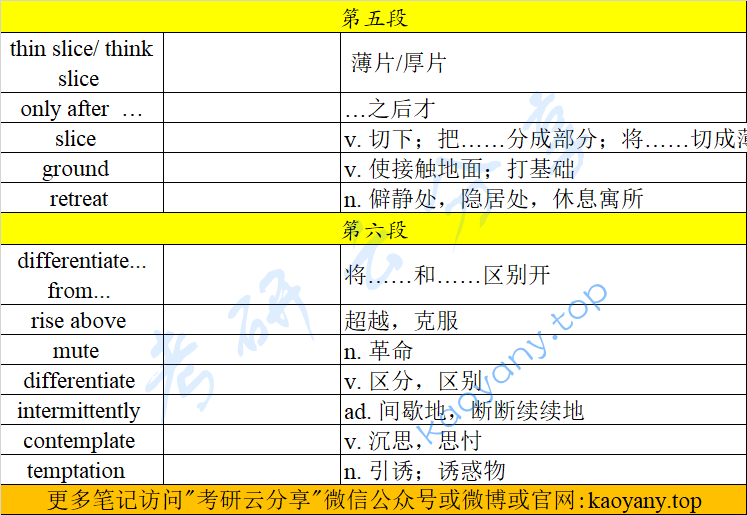第一段
①Scientists have found that although we are prone to snap overreactions, if we take a moment and think about how we are likely to react, we can reduce or even eliminate the negative effects of our quick, hard-wired responses.
单词&词组
prone a. 有……倾向的;易于;倾向于
snap a. 仓促的、匆忙的
eliminate v. 消除;排除
hard-wired a. 直觉的、天生的、本能的
本段翻译
科学家已经发现:我们虽然易于做出快速过激反应,但是,如果花点时间揣度一下我们可能会做何反应,就可以减少甚至消除快速本能反应的负面影响。
第二段
①Snap decisions can be important defense mechanisms; if we are judging whether someone is dangerous, our brains and bodies are hard-wired to react very quickly, within milliseconds.②But we need more time to assess other factors.③To accurately tell whether someone is sociable, studies show, we need at least a minute, preferably five.④It takes a while to judge complex aspects of personality, like neuroticism or open-mindedness.
单词&词组
snap decision 快速决策,仓促决定
important defense mechanism 重要防御机制
be hard-wired to do sth. 天生会做某事
mechanism n. 机制
assess v. 评定,评估
preferably ad. 较好,更适宜
neuroticism n. 神经质,情绪不稳定性
本段翻译
快速决策可能是重要防御机制;如果要判断某人是否具有危险性,毫秒间我们的大脑和身体便会本能地快速做出反应。但是,我们需要更多时间来评定其他因素。研究表明:要准确辨别某人是否好交际,我们至少需要一分钟,五分钟会更好。想要评判某人性格的复杂面,如神经过敏或思想开阔,则需要花上一段时间。
第三段
①But snap decisions in reaction to rapid stimuli aren't exclusive to the interpersonal realm.②Psychologists at the University of Toronto found that viewing a fast-food logo for just a few milliseconds primes us to read 20 percent faster, even though reading has little to do with eating.③We unconsciously associate fast food with speed and impatience and carry those impulses into whatever else we're doing, Subjects exposed to fast-food flashes also tend to think a musical piece lasts too long.
单词&词组
stimuli n. 刺激(stimulus的复数)
exclusive a. 独有的,专有的,独占的
realm n. 领域,范围
prime v. 使准备好
impulse n. 冲动,心血来潮
in reaction to rapid stimuli 应对快速刺激
be exclusive to 专为……所独享
interpersonal realm 人际领域
a fast-food logo 快餐标识
prime sb. to do sth. 使某人准备好应付某种情况
have little to do with 与……无关
associate... with... 将……和……联系起来
本段翻译
但是,因瞬间刺激而做出快速决策并不专属于人际范畴。多伦多大学的心理学家发现,即便阅读和进餐没什么关系,但只看几毫秒的快餐标识就会促使我们将阅读速度加快20%。我们无意识地将快餐与快速和急躁联系起来,并将这些冲动带到任何一件我们正在做的事情中。接触闪烁快餐标识的受试者也往往会认为一首音乐持续时间太长了。
第四段
①Yet we can reverse such influences.②If we know we will overreact to consumer products or housing options when we see a happy face (one reason good sales representatives and real estate agents are always smiling), we can take a moment before buying.③If we know female job screeners are more likely to reject attractive female applicants, we can help screeners understand their biases-or hire outside screeners.
单词&词组
reverse v. 颠倒;逆转
screener n. 筛选者
bias n. 偏见,偏爱
consumer products 消费品
housing options 住房选择
real estate agent 房产中介
本段翻译
然而,我们可以扭转这些影响。如果我们知道,自己在选择消费品或房屋时看见笑脸会做出过度反应(这是优秀销售代理和不动产代理总是面带笑容的理由之一),就可以在购买之前等一等。如果我们知道,女性招聘官更可能拒绝有魅力的女求职者,就可以帮助招聘官们认识自己的偏见——或是聘请外部招聘官。
第五段
①John Gottman, the marriage expert, explains that we quickly “thin slice” information reliably only after we ground such snap reactions in “thick sliced” long-term study.② When Dr. Gottman really wants to assess whether a couple will stay together, he invites them to his island retreat for a much longer evaluation; two days, not two seconds.
单词&词组
thin slice/ think slice 薄片/厚片
only after ……之后才
slice v. 切下;把……分成部分;将……切成薄片
ground v. 使接触地面;打基础
retreat n. 僻静处,隐居处,休息寓所
本段翻译
婚姻专家约翰·戈特曼解释说,这些快速反应只有基于对“厚片”信息进行长期研究之后,我们才能可靠而又快速汲取“薄片”信息。当戈特曼博士真想评定夫妻俩是否会共同生活时,他会邀请他们去他岛上呆上两天,而非两秒,以进行更长期的评价。
第六段
①Our ability to mute our hard-wired reactions by pausing is what differentiates us from animals: dogs can think about the future only intermittently or for a few minutes.②But historically we have spent about 12 percent of our days contemplating the longer term.③Although technology might change the way we react, it hasn't changed our nature.④We still have the imaginative capacity to rise above temptation and reverse the high-speed trend.
单词&词组
differentiate... from... 将……和……区别开
rise above 超越,克服
mute v. 减弱……的声音;使……柔和(这里引申为控制、抑制)
differentiate v. 区分,区别
intermittently ad. 间歇地,断断续续地
contemplate v. 沉思,思忖
temptation n. 引诱;诱惑物
本段翻译
通过暂停来减缓本能反应的能力使得我们有别于动物:狗只能间歇地或是持续几分钟来思考未来。但是,从历史上看来,我们大约花费12%的时间来思索更长远。尽管科技可能改变我们的反应方式,但它还没有改变我们的天性。我们仍然具有丰富的想象能力,去超越诱惑、扭转快速趋向。
五道题
31. The time needed in making decisions may________.
[A] vary according to the urgency of the situation
[B] prove the complexity of our brain reaction
[C] depend on the importance of the assessment
[D] predetermine the accuracy of our judgment
32. Our reaction to a fast-food logo shows that snap decisions________.
[A] can be associative
[B] are not unconscious
[C] can be dangerous
[D] are not impulsive
33. To reverse the negative influences of snap decisions, we should________.
[A] trust our first impression
[B] do as people usually do
[C] think before we act
[D] ask for expert advice
34. John Gottman says that reliable snap reactions are based on________.
[A] critical assessment
[B] “thin sliced” study
[C] sensible explanation
[D] adequate information
35. The author's attitude toward reversing the high-speed trend is________.
[A] tolerant
[B] uncertain
[C] optimistic
[D] doubtful
参考答案
DABCB
答案解析
31、第二段①②句首先指出:判断某人是否危险人物,我们在几毫秒内便可完成;但若评估其他因素,则需要更多时间。③④句进一步指出:判断某人是否爱交际可能需要一到五分钟;判断性格更为复杂的方面则需要花上一段时间。综合可知:紧急情况不同,决定所需时间不同,[D]正确。
32、根据题干信号词a fastfood logo可定位至第三段。第三段指出心理学家发现:人们看到快餐标识可能导致其他非就餐行为的加速,如阅读速度加快、感觉乐曲播放时间变长等,原因在于人们无意识地将快餐与速度、急切联系到一起,并将这些冲动情绪带到我们所做的事情当中,言外之意,人们无意识地将不同行为的感觉加以关联,[A]正确。
33、 根据题干关键词reverse the negative influences可定位至文中第四段。第四段首先表明我们有能力避免这些负面影响,随后列举两个例子加以说明。第一个例子即为“我们如果知道销售员的微笑会促使我们做出快速决策(即冲动购物),那我们就会在购物前多想一想(以避免冲动消费)”,由此可清楚知道,“想好之后再行动”可以消除仓促决定的负面影响,[B]符合文意。
34、根据题干关键词John Gottman定位至文中第五段。段中①句指出, John Gottman认为只有把快速反应建立在大量信息长期研究的基础上,我们才能可靠地依据少量信息做出快速反应,也即,快速“提炼”出可靠的信息来自于对“批量信息”的长期研究,由此可推知,可靠的快速判断的基础是充分的信息,[C]正确。
35、根据题干关键词reversing the high-speed trend定位至文章末段。根据末段, 作者首先认为能否控制快速做决断是人和动物的区别所在,并在最后一句特别提出我们依然具备这种能力。由此可推知,作者认为这是有希望做到的事情,也即,持有乐观的态度。[B]正确。


- 单词 词组
- 本段翻译
- 单词 词组
- 本段翻译
- 单词 词组
- 本段翻译
- 单词 词组
- 本段翻译
- 单词 词组
- 本段翻译
- 单词 词组
- 本段翻译
- 五道题
- 参考答案
- 答案解析
